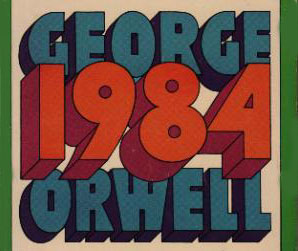[fblike style=”button_count” showfaces=”false” width=”450″ verb=”like” font=”arial”]
by Jack Bragen
[dropcap]A[/dropcap]merican newscasters continue to boast that we have a free and open society, which is what makes the United States a great place. I am not yet afraid of being punished by a dictatorship for expressing myself. Yet, I believe it helps to warn people if we’ve moved closer to the possibility of an oppressive culture.
Already, we see frightening similarities between modern-day American society, and the oppressive culture of fear that George Orwell predicted in 1984, written more than 60 years ago. Instead of the all-powerful government of 1984, our country is in the grip of greedy and monopolizing corporate forces. These can be nearly as oppressive as the horrific government portrayed by Orwell.
In Orwell’s book, society existed in a state of perpetual war. Individuals felt peer pressure, which, by force of fear, made people proclaim their patriotism as loudly as possible. If you weren’t shouting at the top of your voice how great Big Brother was, and how horrible were the enemies of the state, something was wrong with you.
Today, the same expectation exists that everyone must proclaim their patriotism for the “U. S. of A.” Thanks to our previous president, George Bush, we live in a wartime society, and are stuck in pointless conflicts that seem to have no end.
One good thing about the change of U.S. presidents in 2008 is the reduction in the fear level. The Bush administration relied heavily upon frightening the public in order to promote its agenda. While President Obama has a lot wrong with him, he doesn’t use fear as a weapon. However, he is continuing most of the oppressive policies put in place by previous Republican administrations.
The progressive policies Obama boasted of during the campaign seem to have evaporated into thin air. This makes one wonder if the office of president, rather than being autonomous, is actually controlled by other forces, perhaps corporate ones. Only at election time does the progressive version of Obama make a brief reappearance.
Another aspect of Orwell’s society was widespread poverty and deprivation. The protagonist, Winston Smith, who was financially better off than most, could only afford poorly made cigarettes; half the time, the tobacco would fall out before he could get it lit. He drank “Victory Gin,” the only cheap, substandard booze available. If you have looked at cigarettes lately, you will find a brand called “USA Gold,” it’s name reminiscent of Victory Gin. It is, coincidentally, one of the cheap brands that attract those who can barely afford to smoke.
Today, our economy seems to perpetually be teetering on the edge. Unemployment has become an accepted profession among mainstream Americans.
In 1984, the protagonist was a member of the “party,” which in that book was loosely based on the Stalinist regimes that existed at the time in China and the Soviet Union, as well as on fascist dictatorships. Orwell feared the spread of totalitarian parties of the far left and the far right, wherein any type of individuality is severely punished.
The U.S. version of this may create less fear, and is largely based upon greed. It is the party of corporate America. Members are expected to dress a certain way, behave a certain way, and to pay homage to the god of wealth. If you expect to succeed in your goals without being accepted by the U.S. corporate culture, you will be excluded almost universally from the cooperation of entities that could help you succeed.
Our society is in a state of constant surveillance. While this may help solve crimes, it interferes with the privacy of individuals. Businesses are hiring private security forces to monitor the public, especially the poor. It can be crazy-making not to know when and if one is being watched. Orwell predicted constant surveillance by the cameras that were built into televisions of that society. You could go nowhere without being watched by the televisions. In U.S. society, the widespread prevalence of computers has enabled the government to vastly expand its ability to monitor citizens.
The U.S. government wants to promote an image as a benevolent and powerful force. The malevolent government in the book 1984 also portrayed itself as benevolent.
I believe it is unhealthy to love the government. Loving or liking one’s government, to me, is a sickness that could have been responsible for the spread of Nazism, and other oppressive societies. It doesn’t matter if our government is currently doing mostly the right things. We need to constantly be its watchdog, and we need to argue with it good and loud when it oversteps its acceptable boundaries.
